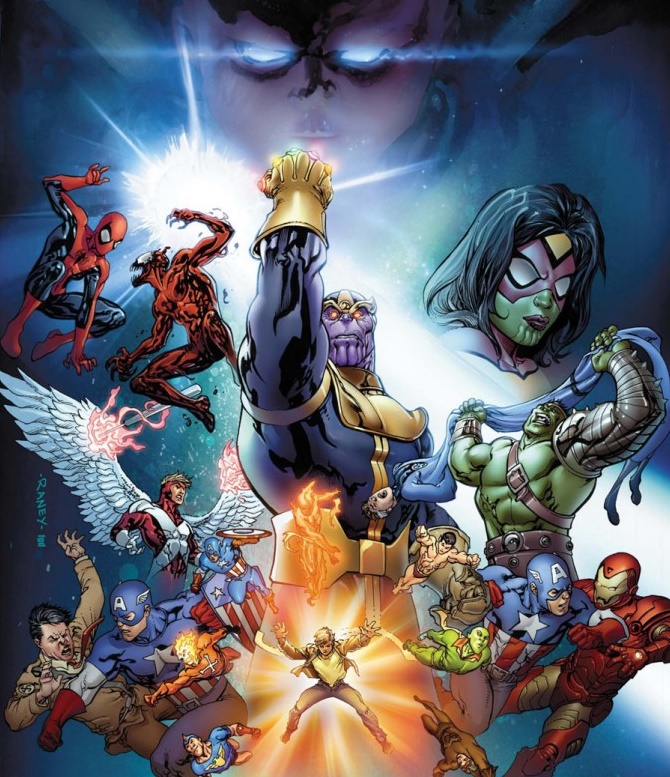We take it for granted sometimes (often with hatred) that every year we will see an event which will attempt to change the face of the Marvel Universe altogether. This is still a relatively new concept at Marvel. Only since 2005 have we had a regular event series. In fact, prior to the post Avengers Disassemble restructuring of Marvel writers, the last official event was the Starlin’s Infinity trilogy in the early 90s. There were some crossovers here and there, but event level stories were not happening at Marvel. Then in 2005, Bendis introduced us to the alternate reality of the House of M and since then we’ve had 16 official events, not including the currently on-going Axis and the recently announced next year event: Secret Wars (and whatever is going to occur with all the multiple retro-redos that have been announced in the past few weeks). Here is a retrospective to help new readers know what to check out and for old readers to relive the love and hate.
Here is a retrospective to help new readers know what to check out and for old readers to relive the love and hatred.
House of M (2005) (w. Brian Michael Bendis) (a. Oliver Coipel)
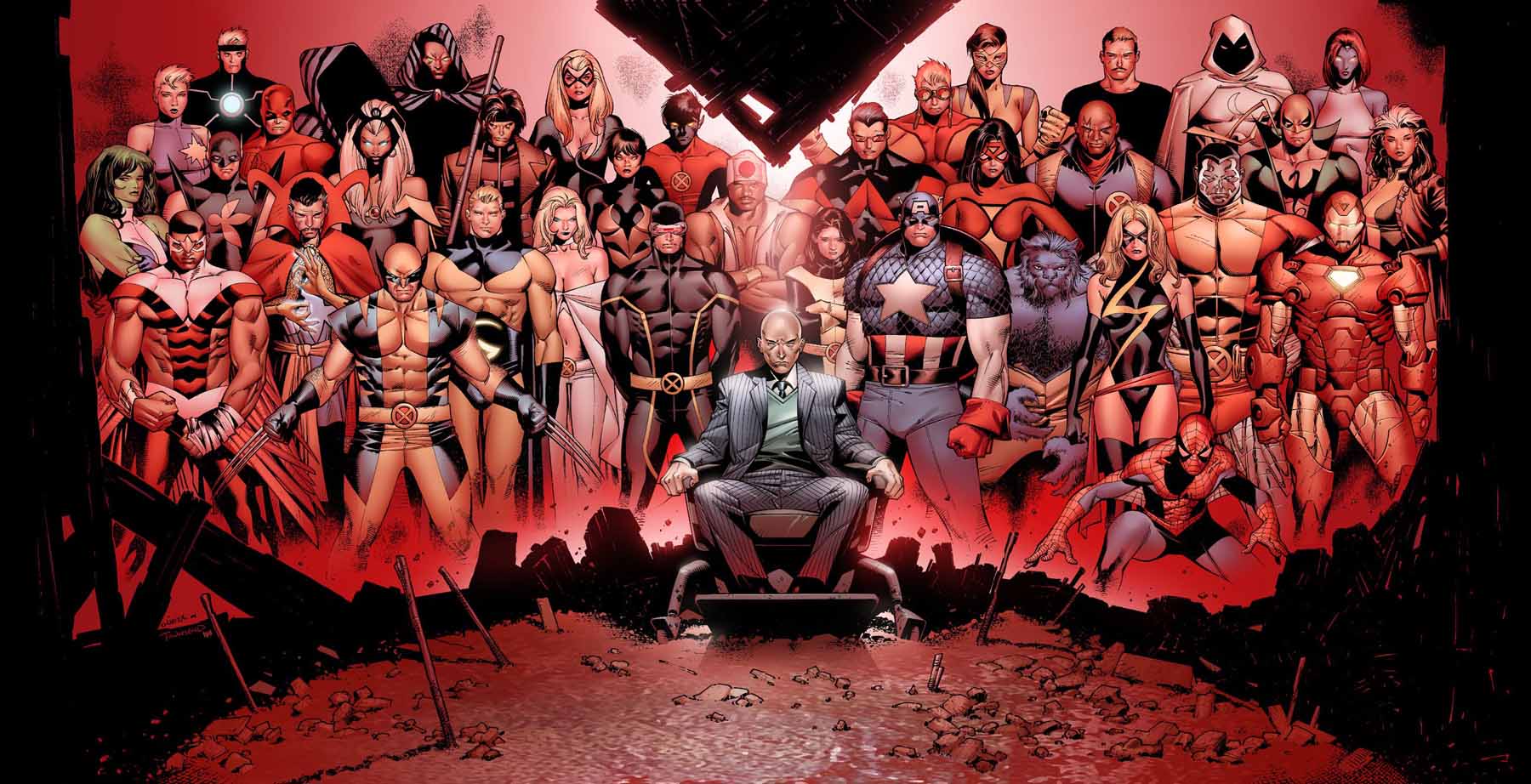
Description: It turns out Scarlet Witch is more powerful and crazier than anyone knew.
Outcome: No More Mutants and Wolverine’s Past
This was the modern start of the yearly event. If you hate event series now you can blame this one series. At the time, those of us reading Astonishing X-Men and New Avengers were extremely confused that our books disappeared for six months. We can probably credit John Cassaday for inspiring that decision. The great thing about this event is that more than any other event (apart from Annihilation) it has had extremely long lasting ramifications… seven years to be exact.
Annihilation (2006-2007) (w. Keith Giffen) (a. Andrea Di Vito)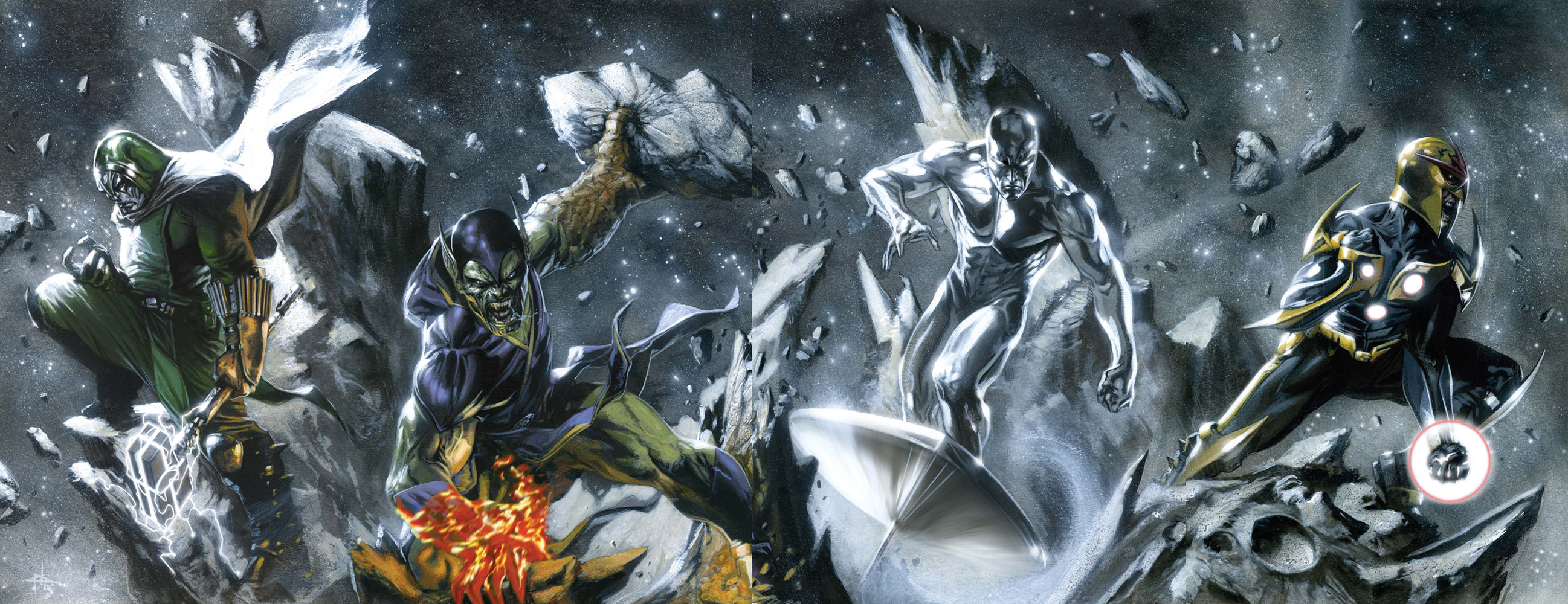
Description: Annihilus and his Negative Zone lackeys invade the cosmos.
Outcome: The start of the modern Marvel cosmic legacy and Richard Rider scores one of the most violent kills in comics.
This is often attributed as the start of Abnett and Lanning’s epic space opera, but it was actually constructed by Starlin’s cosmic predecessor Keith Giffen. Abnett and Lanning lent their talents to the multiple tie-ins for this project. If you are a fan of sci-fi or the Guardians of the Galaxy movie this is definitely the perfect place to start reading.
Civil War (2006-2007) (w. Mark Millar) (a. Steve McNiven)
Description: Reality shows are evil and cause good guys to kill other good guys.
Outcome: Steve Rogers dies (not for too long) and Peter Parker is revealed as Spider-Man (also not for too long).
This is probably the best event series Marvel has ever put out because at the time it was a hugely original concept pitting heroes vs heroes. While the fallout of this series was cleaned up too quickly (see Spider-Man’s One More Day) and the effects are no longer really felt to this day (unless you were a big fan of Black Goliath) the writing and originality has made this still a memorable series to Marvel fans.
World War Hulk (2007) (w. Greg Pak) (a. John Romita Jr) 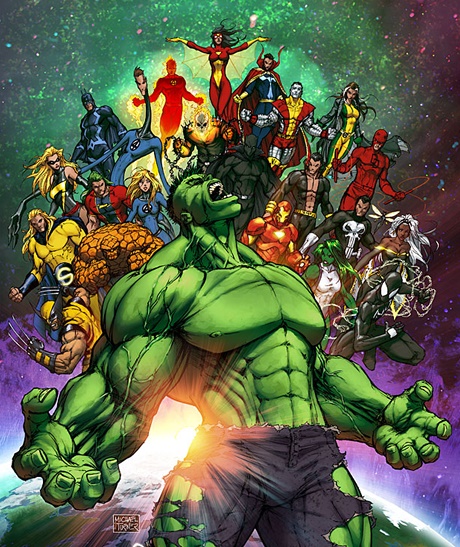
Description: Hulk’s feelings are hurt by the Illuminati and he discusses those feelings with them.
Outcome: Dr Strange’s hands are crushed (again) and Greg Pak runs out of ideas.
I’m not a fan of John Romita Jr unless it was his stint on Amazing Spider-Man, but with that said this was a great event. It was a completely logical outcome of events which started several years earlier and this was the grand and epic conclusion to that story line. Also, while most tie-ins to series can be skipped the street level tale that concluded the then Heroes for Hire series is one I strongly recommend and the X-Men tie-in is just Hulk fighting all the X-Men and it is fun.
Annihilation: Conquest (2007-2008) (w. Dan Abnett & Andy Lanning) (a. Sean Chen)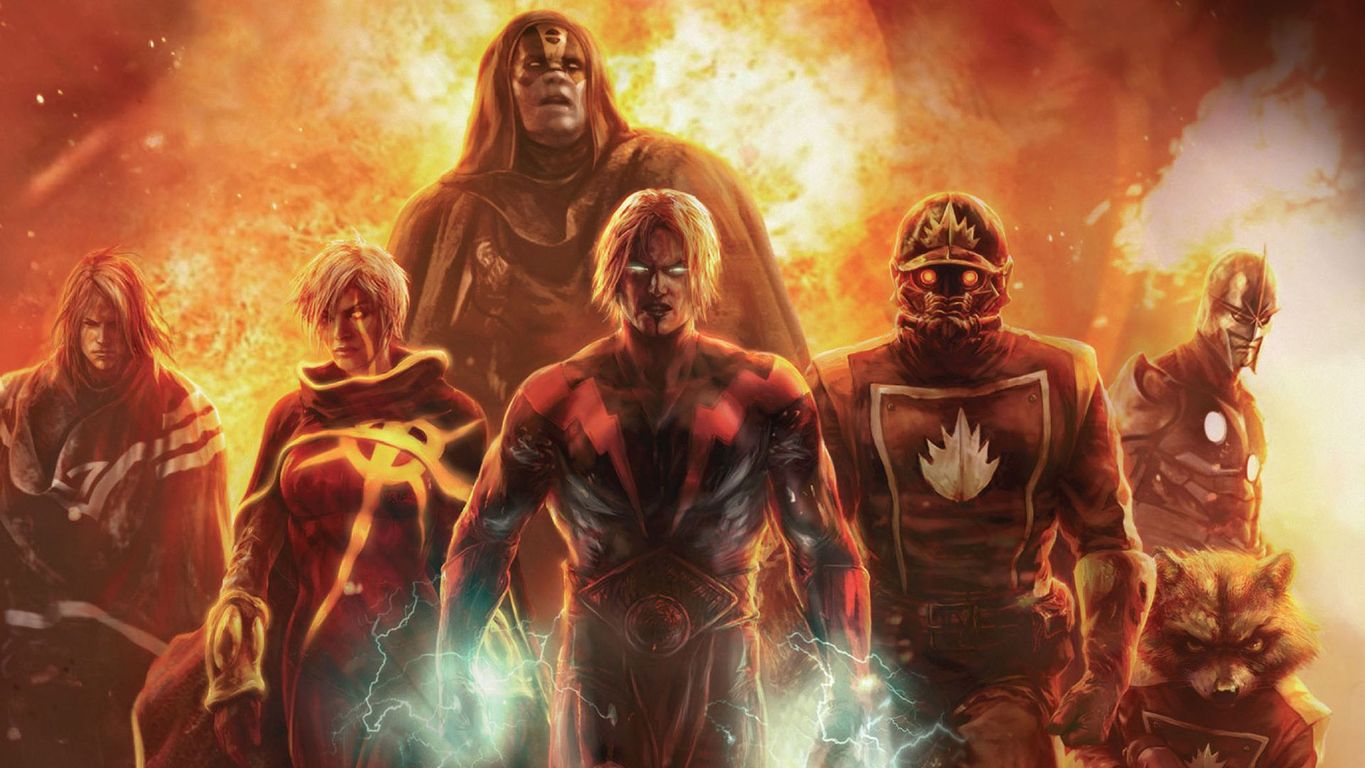
Description: Ultron and the Phalanx are stopped by a raccoon.
Outcome: Gaurdians of the Galaxy!
This is the true start of the DnA space opera epic which is a phenomenal series especially for those who loved Marvel’s cosmic stories since the 70s. The characters used to tell this tale are a who’s who of random cosmic b-listers and from that a modern classic was born.
Secret Invasion (2008) (w. Brian Michael Bendis) (a. Leinil Francis Yu) 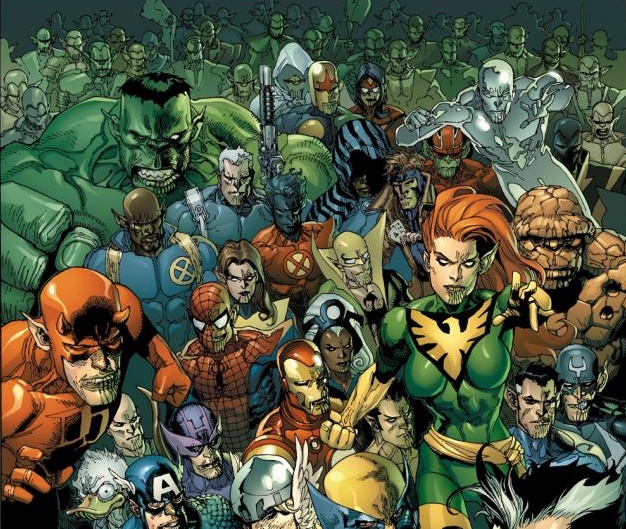
Description: Skrulls invade and fail, just like in Fantastic Four #2.
Outcome: Norman Osborn takes over for a bit and some fan-loved b-listers return to life.
This event was four years in the making when it was hinted at in the first few issues of New Avengers. Bendis actually planned on this being a story told inside the Avengers series at the time, but editors at Marvel liked the idea and they encouraged it to become an event. This was not an awful event, but it was the last one to have an honest impact for an extended period on the Marvel Universe when Warren Ellis’ Thunderbolts were used to end the invasion and Osborn became the head of SHIELD (or HAMMER). This was a slightly longer event than it should have been, and it could’ve had an issue or two cut to give it a stronger pacing.
The Siege (2010) (w. Brian Michael Bendis) (a. Oliver Coipel)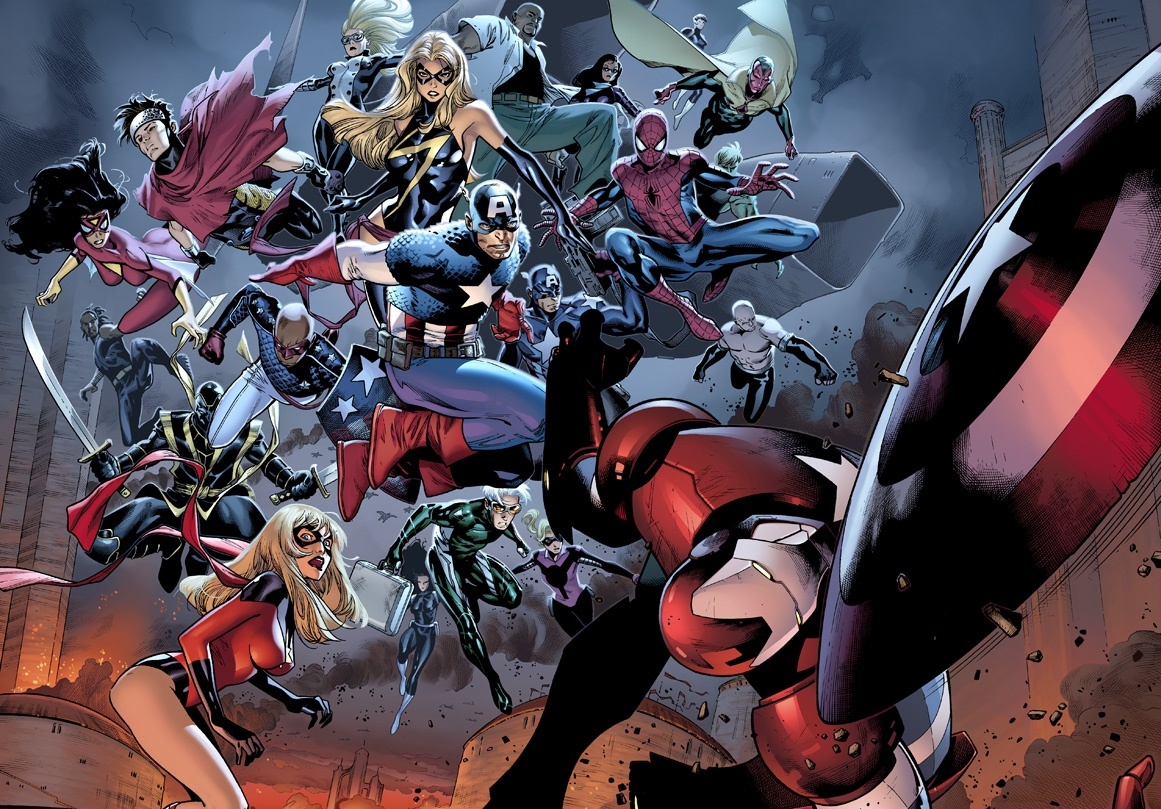
Description: Norman Osborn tries to prove Nietzsche right.
Outcome: Osborn is dethroned and (most notably) Sentry and Ares are killed.
Luckily this one was only four issues, not because it was bad, but because that’s all the story needed. While it isn’t nearly the best event series it does boast of killing off two characters which have remarkably stayed dead since.
The Thanos Imperative (2010) (w. Dan Abnett & Andy Lanning) (a. Miguel Angel Sepulveda) 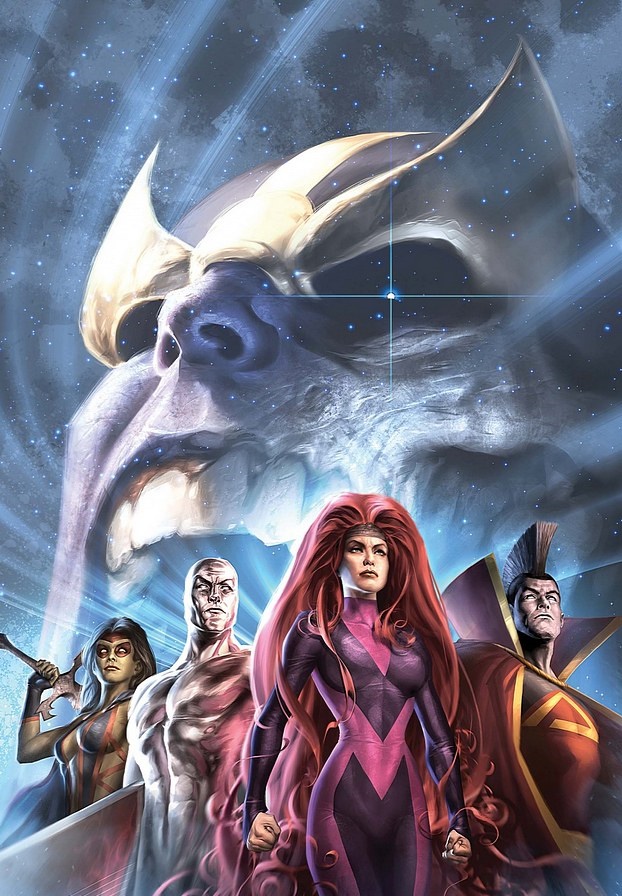
Description: There are things worse than Thanos.
Outcome: The end of the Nova and Guardians of the Galaxy series with the apparent deaths of Richard Rider and Peter Quill.
This is the book end to the epic space opera composed by DnA. With a great and crazy story and superb art, this didn’t let down too many fans that had been following this epic for the past four years. The biggest problem was it ended up killing off two characters who we all love. One has somehow come back (although it was never explained) and the other was tragically replaced by a character created for a children’s cartoon.
Shadowland (2010) (w. Andy Diggle) (a. Billy Tan) 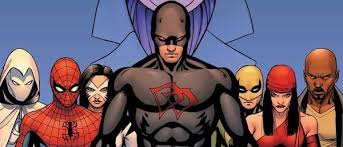
Description: Daredevil did Bullseye like Bullseye did Elektra and becomes a bit too much of a devil.
Outcome: Black Panther takes over Daredevil for a bit.
This flew under some radars being that it involved almost exclusively street level characters, but that didn’t mean it was bad at all, especially if you enjoy those types of characters. This story revolves around Diggle’s run on Daredevil, but is welcoming enough that you are not required to have read that before this series. The multiple tie-in issues for the most part are a waste.
Chaos War (2010-2011) (w. Greg Pak) (a. Fred Van Lente) 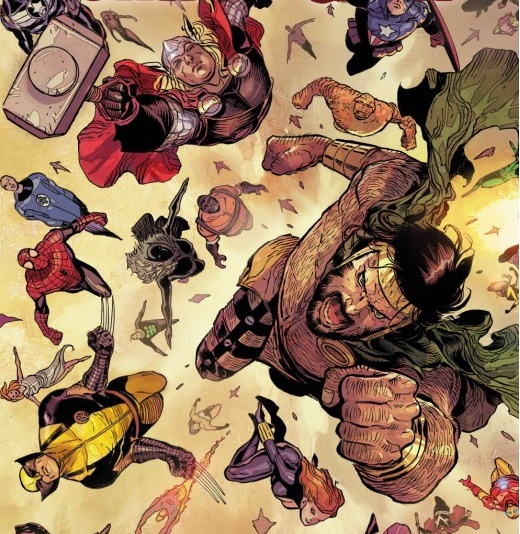
Description: You know where I said Greg Pak ran out of ideas? That’s all you need to know.
Outcome: Nothing, because no one cared.
I never finished reading this series, and I read none of the tie-ins. It was so bad that it is barely recognized as an event by fans or by Marvel. If you’re bored enough to read this series then you may have nothing to live for.
Fear Itself (2011) (w. Matt Fraction) (a. Stuart Immomen & Steven McNiven)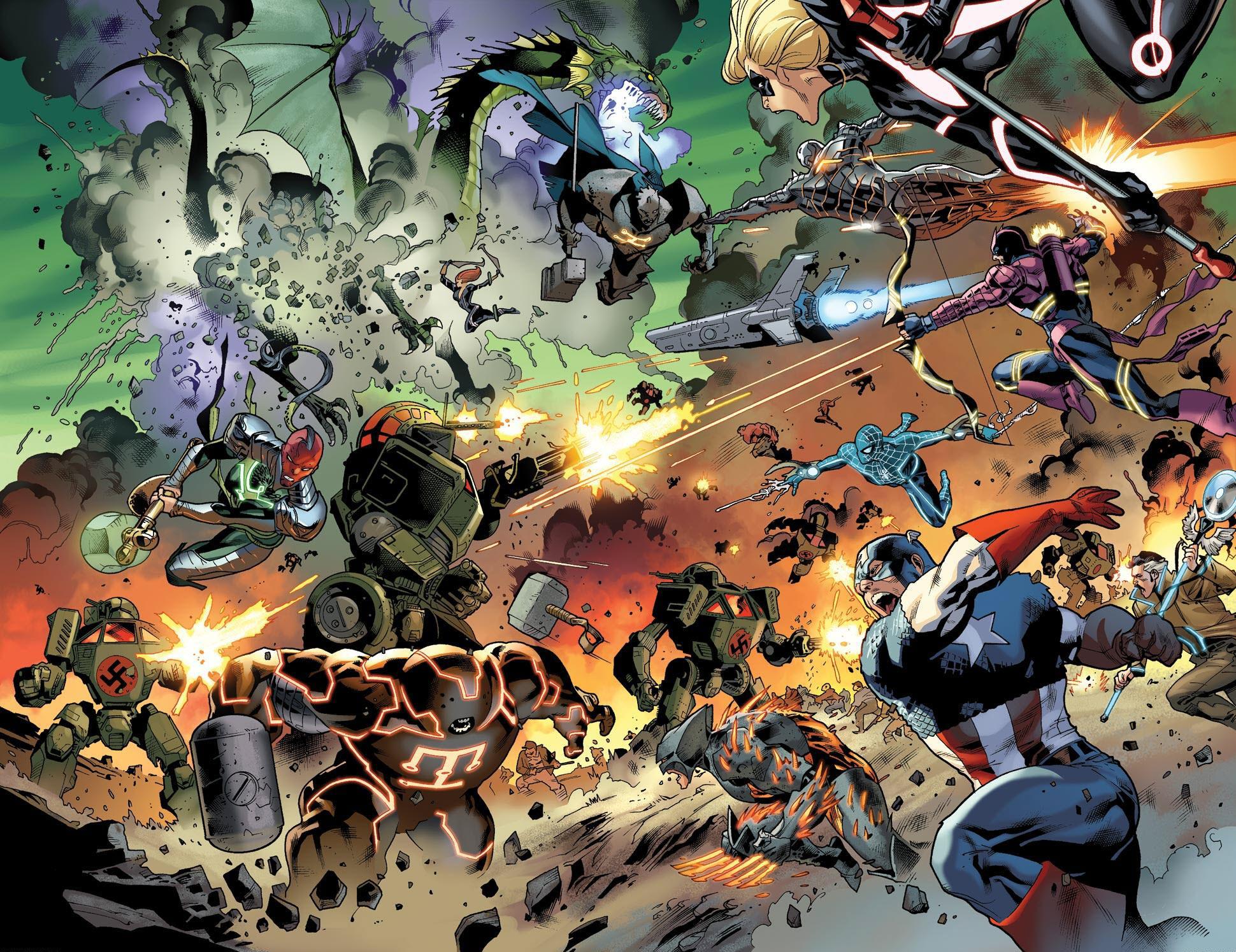
Description: Odin goes Oprah on the heroes of Earth and everyone gets mystic weapons to kill Nazis and an evil god.
Outcome: Steve Rogers takes back the Cap mantle when Bucky dies (he gets better).
A lot of people hate this event, and I’ll agree that it isn’t great, but I don’t think it is nearly as horrible as people deem it. Fraction imposes a bit too much of his personal opinions on things through the characters which cause them to be, well, out of character, instead of making a point or building a strong theme with the story. It was originally supposed to be just a crossover between Thor and Captain America, which probably would’ve made it much more tolerable without the “event” stigma attached. The story isn’t bad though, but it also has the slightest repercussion being that everyone thinks the Winter Soldier is dead, so he has to keep people thinking that.
Schism (2011) (w. Jason Aaron) (a. Various) 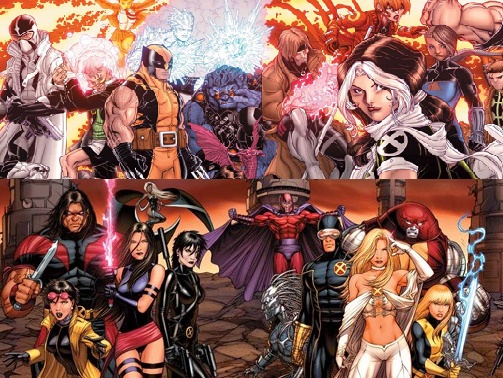
Description: Mutants whine because they weren’t invited to the Civil War.
Outcome: Basically they go back to the blue & gold teams of the early 90s.
2011 was the year for events with good ideas that ignored characters altogether. This event is big and is still kind of important today (constantly referenced, but fans want it reversed). The issue with this is instead of using the characters’ natural progression to make this happen, it was forced out of their throats and most did not sound like who we thought they were.
Avengers vs X-Men (2012) (w. Various) (a. Various)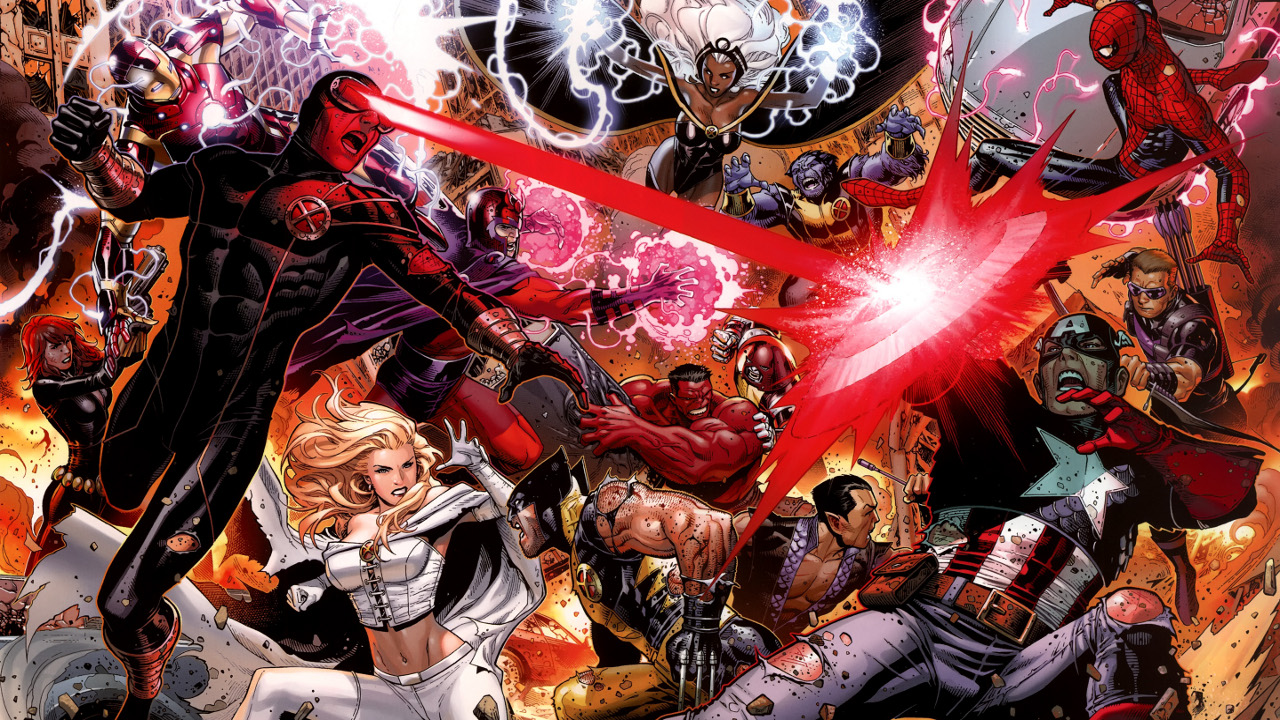
Description: The Phoenix makes people bigger jerks than before.
Outcome: Xavier dies, Wakanda goes all New Orleans, and House of M is finally reversed.
This twelve issue series boosts of having some really great and powerful issues, but the other half of the story is weighted down in muddled writing. Some of the events which transpire are actually huge and still have consequences today but for the most part it ended up being a disinteresting story where not nearly as much happened as the writers tried to make you think did.
Age of Ultron (2013) (w. Brian Michael Bendis) (a. Brian Hitch & Various) 
Description: People talk, Wolverine kills a bunch of people (including himself), and Ultron never shows up.
Outcome: Angela comes to the 616.
I get what Bendis was doing, but it couldn’t have been handled worse. There used to be days when event issues were oversized and things happened. Well, for Age of Ultron we had the minimum number of pages and a lot of talking. Also, the ending was leaked on the Internet by Marvel a month before it dropped. It was the worst case of poor marketing, bad editing, over-indulgent writing, and poorly titled series in Marvel’s history.
Infinity (2013) (w. Jonathan Hickman) (a. Jim Cheung & Jerome Opeña)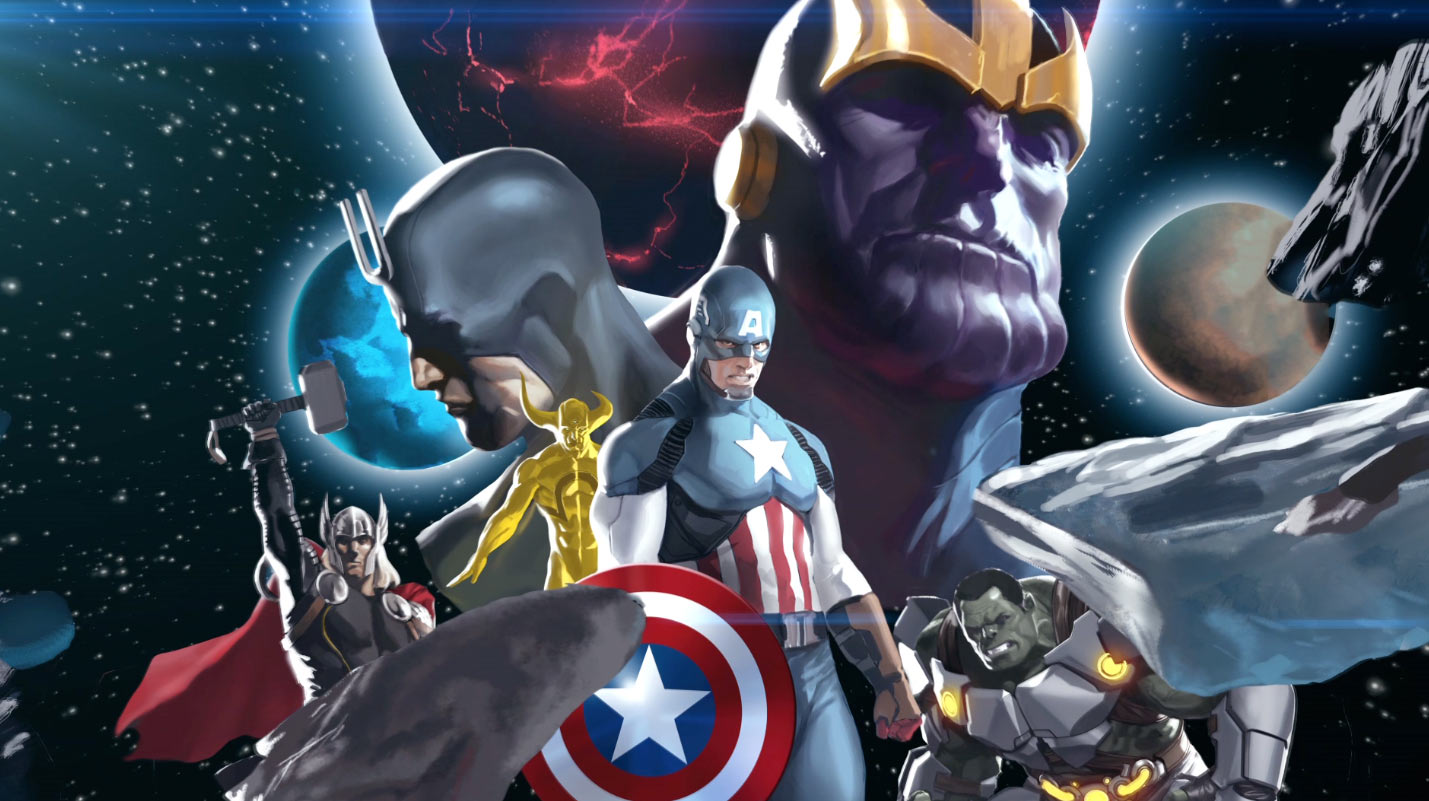
Description: A lot happens, and it is cool, but at the same time nothing really happens at all.
Outcome: Thanos does his best impression of the mosquito from Jurassic Park and everyone becomes an Inhuman.
I liked this series a lot. There were some really cool moments, but overall nothing really happens. Most of the battles are fought off panel (or in tie-in books) and that includes Thanos’ invasion. But that doesn’t mean it was bad, just awkward at moments. Thor killing a Builder in the second to the last issue was possibly one of the greatest moments in comics in many years. The one thing I will say is, why was this called “Infinity?” It has nothing to do with the Infinity Gems or anything like that. The title is just a red herring to confuse us so they can have an introduction of Thanos’ son who has completely disappeared since this series.
Original Sin (2014 )(w. Jason Aaron) (a. Mike Deodato Jr)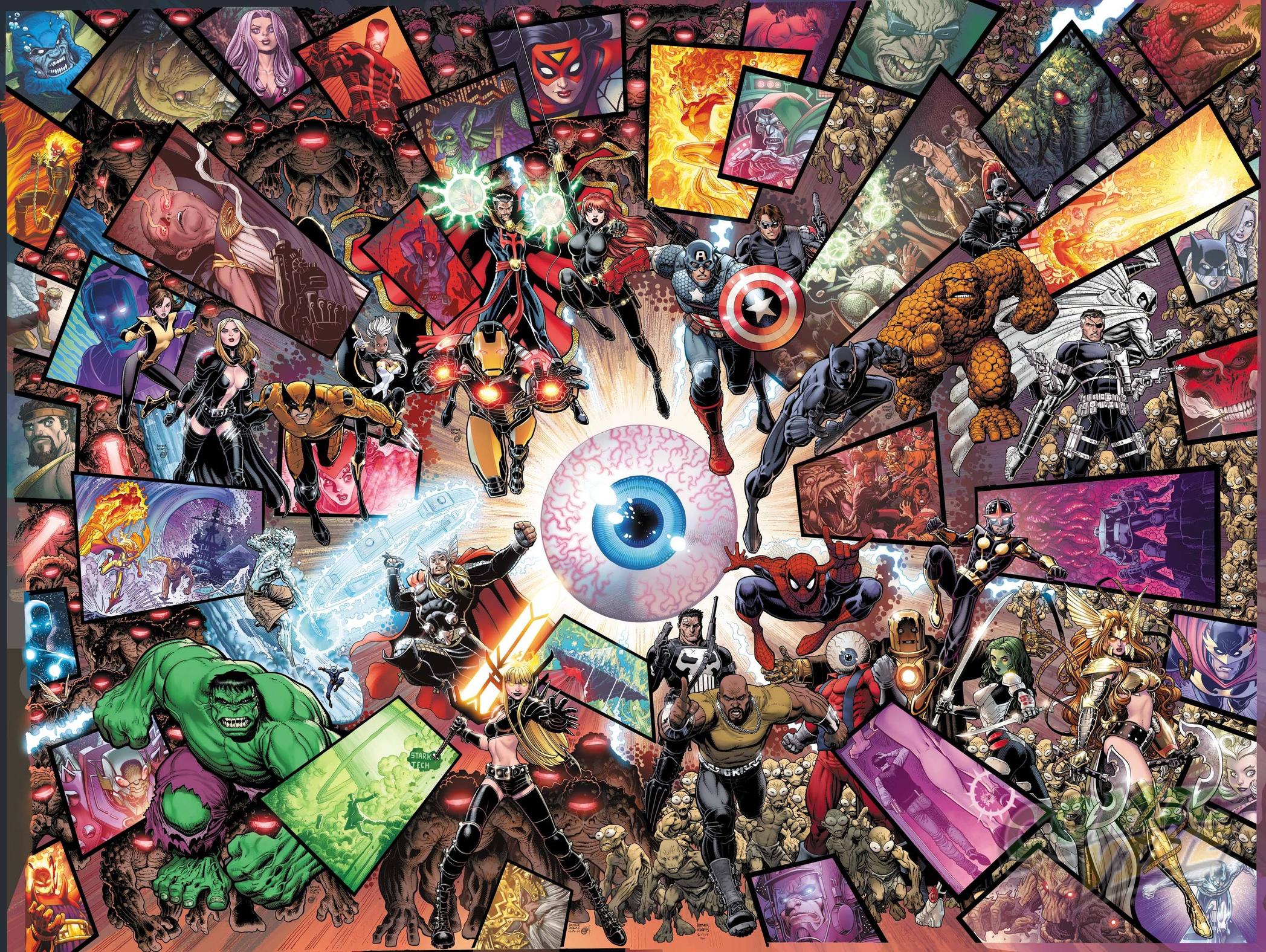
Description: A lot like Infinity, nothing happens, but it’s still kind of cool.
Outcome: Bucky in space, Fury on the moon, and Thor now urinates sitting down.
There is a group of villains who you would only know if you read one short (but decent) series by Grant Morrison a decade ago and for some reason they are in this book. I never figured out why or their real purpose. Nick Fury kills the Watcher after the Uatu steals Nick’s look. Then Nick gathers heroes to investigate and follow clues back to him (?) in a rather random fashion that, while it creates a very cool retconned back story to the 616, makes no sense in how that history is discovered by the extremely eclectic band of heroes. Bucky says the most awful thing ever spoken in Marvel Comics to the Punisher, and Nick whispers sweet somethings into Thor’s ear. Nothing really happens, but what does doesn’t make sense, but it is really pretty.

